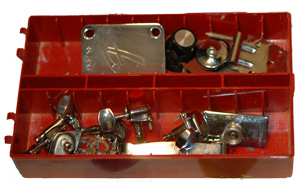When you are looking for something special or you think you can be cheaper, you can push the boundaries. The range worldwide is enormous, maybe you can look around on the spot during a foreign visit what is for sale. But often you will have to arrange it from home, and looking and touching first is not an option.
You may run the least risk when you buy from a reputable dealer.
The foreign guitar shops
Various stores have experience in delivering their products worldwide. You first gather the necessary information via their website and contact via e-mail. Make sure you have a Credit Card and / or PayPal and you can go ahead. Keep in mind extra costs for customs clearance and VAT when you order something outside the EU.
eBay
If you exercise some caution, eBay is also a great resource. Sometimes a fixed amount is mentioned, but usually it is a matter of the highest bid. The actual bidding starts a few minutes before "the auction" ends. Fortunately, you can indicate a maximum bid in advance and you will automatically be bid for until the indicated maximum has been reached. You do not have to be there yourself and you can switch off your computer. Due to the time differences, you may find out the following morning that you bought something that night.
 I myself have experience with eBay within Europe and from the US. Before I dare to make a bid, I first weigh a few points to hopefully limit the risk somewhat
I myself have experience with eBay within Europe and from the US. Before I dare to make a bid, I first weigh a few points to hopefully limit the risk somewhat
A. From which country do you sell? An offer may still look so nice, but in practice I only look further when the seller is located in Europe or the US. Indeed I will leave a great offer from, for example, Nigeria.
B. Do people sell to someone in the Netherlands? Indeed, some sellers have limitations in this. View this in advance and sometimes you can consult and persuade someone to sell to you. They will then look at your eBay references and want to have the costs of packaging and transport clear in advance.
C. The description and photos. A detailed description with clear photos can mean that you handle the merchandise seriously. I expect not only photos of the beautiful sides of the product, but also details about possible damage and the less attractive spots.
D. What are the experiences of others with the seller? On eBay you can find references from people who have previously purchased something from the person in question. Read the reactions carefully and don't just look at the score you give.
E. How many items have previously been sold through eBay? Someone who offers something for the first time can be a reliable seller, but I prefer to do business with someone who has already successfully completed various transactions.
F. Do you have experience with selling and shipping guitars? A person who does not know anything about the product can also not properly estimate what he is selling. Not everyone can carefully pack and ship an instrument abroad 'safely'.
G. What payment options are there? At eBay I always choose PayPal. Sometimes this is not possible with the provider and, for example, money must be transferred. Make sure you have selected this before you bid.
H. Communication. In advance I always ask various questions about the item via email. Someone who is serious about their sales practices will also often try to return an honest, clear and prompt answer. A response such as "just look in the ad, that's all I know" is reason for me to drop out immediately.
If you follow the steps above, there is no guarantee that you will not buy a "cat in a bag". You only reduce the risk. Indeed I left interesting looking things because one of the above points did not meet my expectations.
 Flea market
Flea market
A flea market is organized twice a year in Ibbenbüren (just over the border near Enschede). Stalls with various used musical instruments and bins full of parts. Anyone can be free of charge anywhere on the market during those days.
Even if you don't even plan on buying anything, consider it a fun outing. The site is located next to the large German music store "Musik Produktiv" which you can immediately visit.
CITES
CITES stands for "Convention on International Trade in Endangered Species of wild flora and fauna". It is a list of animal and plant species in which it has been agreed worldwide that they deserve some protection. This contains, for example, ivory, turtle shell but also rosewood. Trade is prohibited for some items in the list, in other cases permits or certificates are required.
Paul Reed Smith birdAll types of rosewood are protected by CITES from early 2017. Brazilian rosewood had previously had to meet strict import and export requirements. In my situation it concerned the Paul Reed Smith Custom from 1989, which was why a corresponding certificate was already present. For new (bass) guitars (from 2017) in which rosewood has been processed, "the shop" now has to provide a certificate.
However, if you already have a guitar, chances are that rosewood has been used. Consider, for example, the dark brown key on the neck. This type of wood is also often used with acoustic guitars at the side or back of the cabinet. As the owner of the guitar you can of course just play it and you can trade the instrument within the EU if you wish. If possible, try to keep the original purchase receipt. Otherwise, see if you can still arrange a proof of purchase with your guitar farmer.
Leave the instrument Europe, because you want to perform with it or because you are going to sell it, it is advisable to apply for a "Certificate" via the Dutch government website. There are costs associated with this request and you must be able to demonstrate that (bass) guitar has been legally obtained (do you still have the purchase receipt somewhere?). In addition, details are requested such as the brand, the year of manufacture, the serial number supplemented with photos. It is somewhat to be expected that the trade in older guitars from and to Europe can become somewhat more difficult due to these measures.
At the end of 2019, the rules for using rosewood in the music industry have become less strict. An exception has been made, so that musical instruments can be traded internationally again without a certificate. Certainly compared to the furniture industry, the use of such woods proved to be limited in practice.

